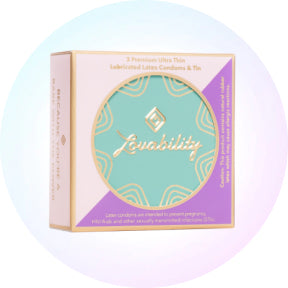Babe With The Power — Feminism
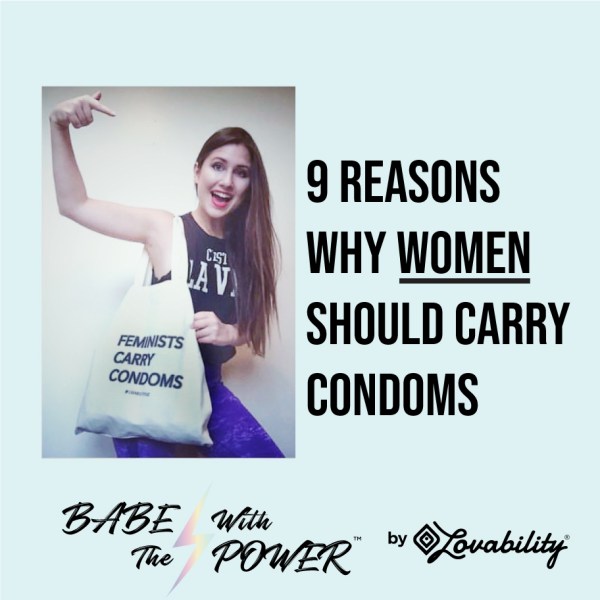
Why WOMEN Should Carry Condoms
Ladies, it is time to lean into your sex life and take the protection power into your own hands. Not convinced? Here are 9 reasons why women should carry condoms.
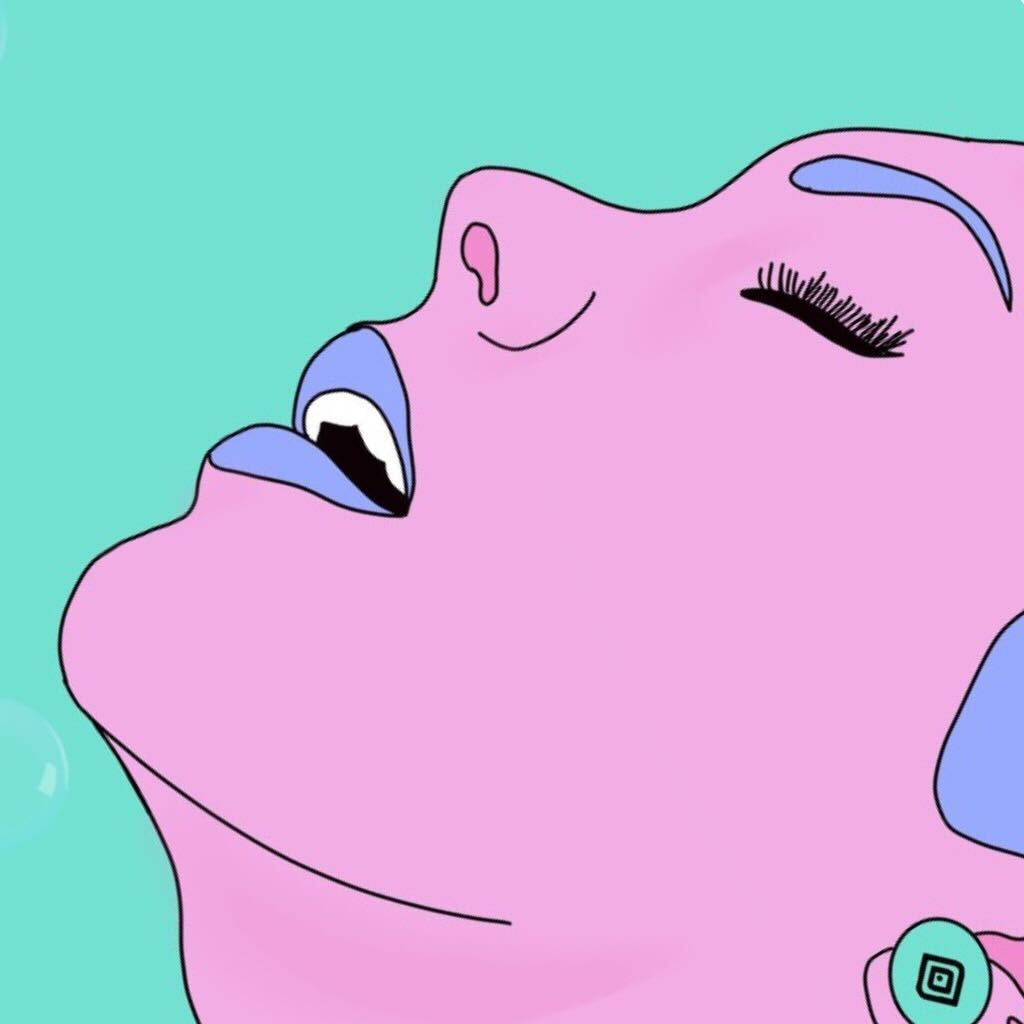
Feminists-Against-Faking-It
If you're having orgasm-less sex, it's time to speak up and take action. Here are our tips to help communicate with your partner and empower yourself to stop faking it!

Breaking News: The Orgasm Gap is As Wide As Ever!
Thinking too much about how to please your partner but not about your own pleasure? The orgasm gap is real! Here are 6 tips to help you get your share of pleasure - with a not-so-gentle reminder that orgasms shouldn't be the measure by which you define a successful sexual experience.
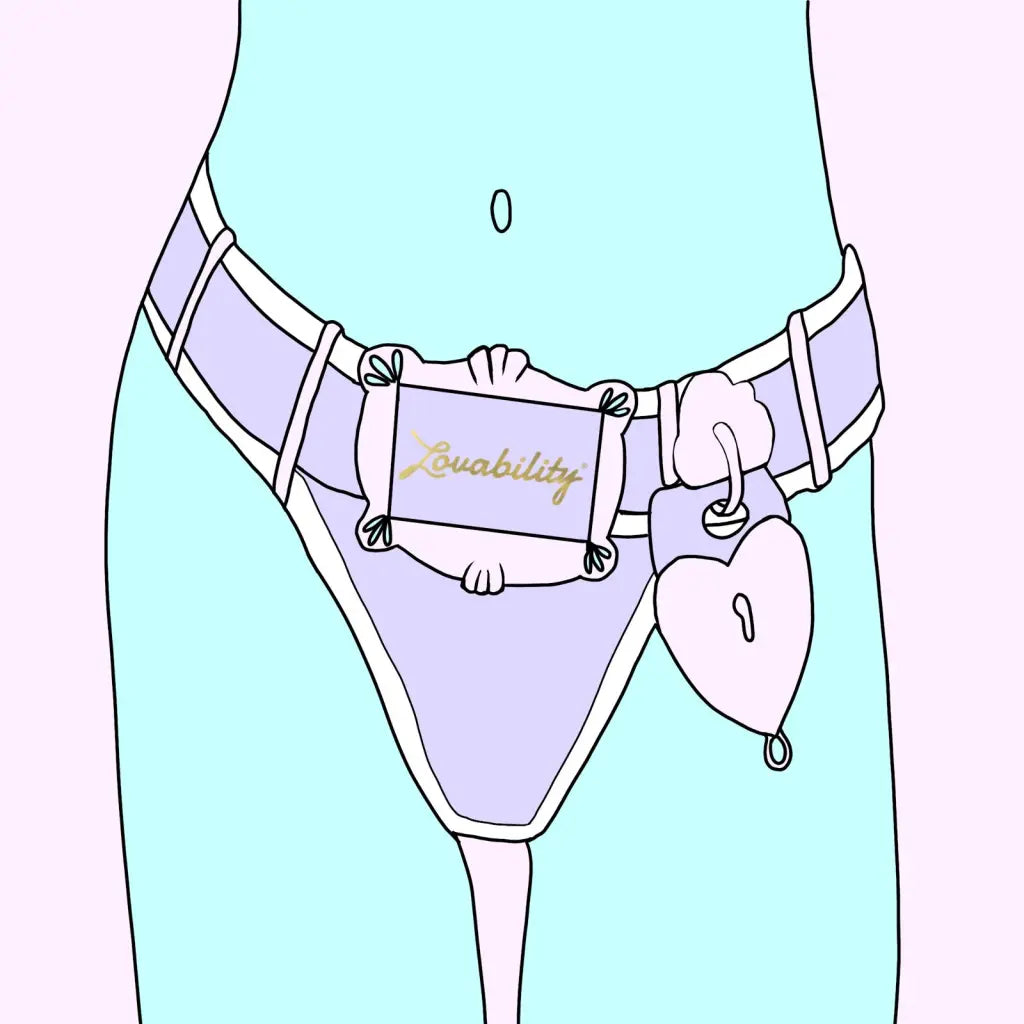
Can You be Desired AND Respected?
The Madonna-Whore Complex forces women into two false categories: pure or desirable. We say: be yourself! When you own your sexuality, it is your choice to be who you want to be. Check out our tips for how to reframe how you think about yourself and the world.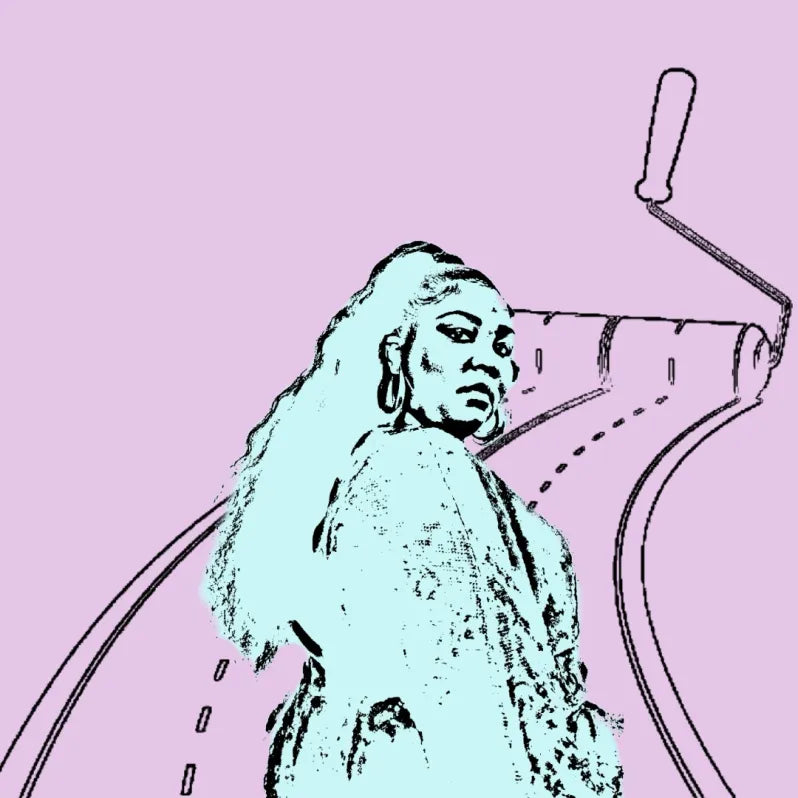
We Paved the Way: Black Women Were Sex-Positive Throughout History
Throughout history, Black women taught us de-stigmatization, displayed liberation in their sex work, strategized around choice to conceive and control over their bodies, and then fought for their rights so other black women could do the same.

When Great Sex Doesn’t End In An Orgasm (And Why That’s OK!)
Elizabeth explores her struggles with feminism, orgasms and empowerment, and shares why she believes great sex doesn't require the Big O.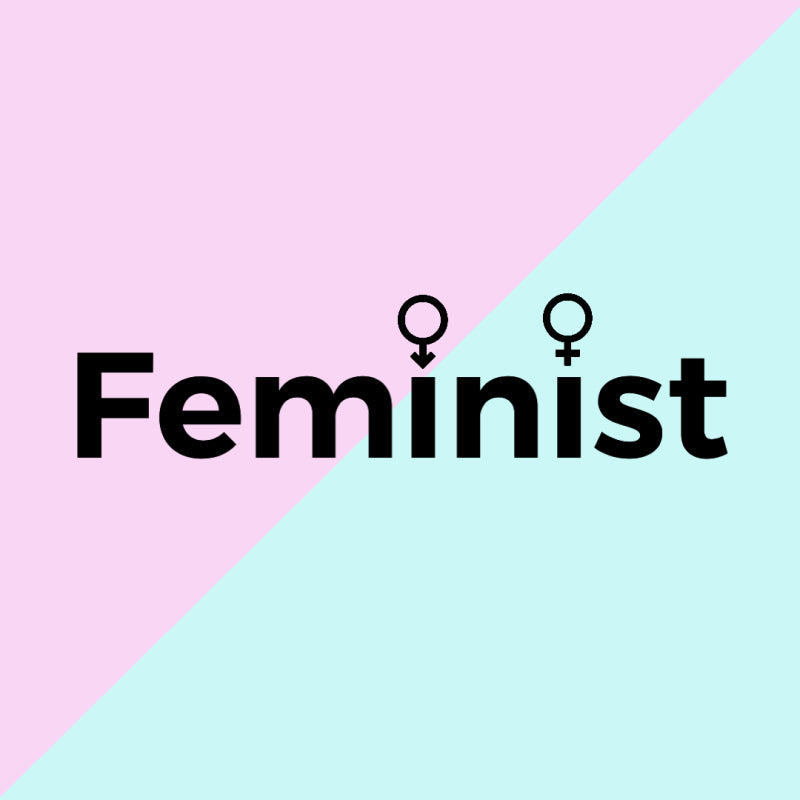
Men Can Be Feminists, Too
So your girlfriend or partner is a feminist? If she showed you this article — or even if you found it yourself — we trust that you’re a good guy, but maybe you need just a little help or a refresher. Maybe you learned how to be a good boyfriend from your dad, your older brother, a childhood buddy. You learned how to be a chivalrous gentleman: you’re respectful and honest, you bring flowers on the first date, you open the car door for her, etc.
But when it comes to dating a feminist, there’s a big question mark. Can you still do everything you were taught, or is she supposed to get the flowers and open the door for you? Are you allowed to be a feminist, too?
Don’t worry. We’ve got you covered. Yes, men can be feminists too, here’s how:
Listen
When your partner complains about her coworker who refused to use her ideas, or about the catcaller at the mall, or how she laces her keys between her fingers to stay safe walking home at night… listen. Though you may not understand, take the time to hear her out. And don’t try to solve her problems for her — again, listen. Ask her what she needs, how you can help, or ask more questions to understand her perspective.
Openly communicate relationship dynamics
Just because your partner is a feminist, doesn’t necessarily mean that she always hates traditional roles and expectations. While she might be open to paying for dates, some feminists think it’s romantic for her partner to pay for the first date. Some feminists always go dutch. In terms of household duties, some women (myself included) prefer to clean the whole house just because they want to do it their way. On the flipside, you may love to cook, while your partner burns toast. Have an open conversation about what you and your partner prefer and are willing to do.
Believe in her power to choose
Yes, this includes reproductive rights, but it’s not all we’re talking about. Respect your partner’s power to choose what is best for herself in all aspects of her life. Her wardrobe, her diet, her career, and more are all up to her. While she’ll likely be welcome to your input on some things and there will likely be choices that you need to make together, make sure that the choices about her life are ultimately up to her.
Share responsibility of contraceptives
Be open about your expectations for safer sex practices.
For condoms, you may have a certain brand and style that feels comfortable to you, but consider that she may have a certain brand that she prefers. Remember, condoms and lube go inside vulvas and vaginas, meaning there may be higher stakes involved when your partner selects condoms. After negotiating brands, make sure you both have a supply (if you live separately) and equally monetarily contribute to purchasing safer sex supplies.
If your partner chooses to use contraceptives like the pill, ring, IUD, injection, implant, or patch, recognize that this may be a large risk to your partner who may experience uncomfortable side-effects. Be understanding of this experience and defer to the first piece of advice on this list if she shares any complaints with you.
If you are in a long-term relationship and her contraceptives aren’t fully covered by insurance, consider going halfsies on the cost of her contraceptives. And if you ever have to use emergency contraceptives, consider splitting the cost of this purchase as well.
Do your own research
Make sure that you aren’t depending on your partner or other women in your life to educate you on feminism. Do some independent work yourself. Doing something as simple as reading a few articles from Babe with the Power, Bustle, Ms., Refinery 29, or Bitch can be helpful in updating you on the latest feminist news. Following a few feminist figures, reading feminist books, watching feminist movies, or listening to feminist podcasts can help encorporate learning about feminism into your every day life. Trust me, she’ll be very impressed when you pull out a feminist fun fact or start talking about feminist news on your next date.
Know (or learn) that feminism is for you too
That’s right, feminism is for EVERYBODY!!! (*Insert Oprah shouting, “You get some feminism, and you get some feminism,” here*)
Yes, feminism does focus on women because, in most areas of life, women are more disadvantaged and face more gender-based discrimination than men.
Though it’s not brought to light as often, feminism does look at the ways in which men face more issues than women. Feminists want men to be able to feel less shame about seeking mental health access, to reduce pressure for men to be sole breadwinners, to help men to connect with their children, and more!
Balance your compliments
Yes, you probably think your girlfriend is the prettiest girl in the room. And, yes, you probably wish you could look at her all day. But you also like her for other reasons too, right? Show her that by switching up the way you compliment her. Next date night, you may love the way she looks when you see her. Compliment her look when you pick her up. At dinner, talk about how proud you are of her effort at work or how she aced her test. Compliment her kindness or her ambition. Later during the night, feel free to hype up her power in the bedroom.
Have Equitable and Consensual Sex
Cis women are reported to experience less pleasure during sex than cis men. There’s a lot of reasons for this, but you can help be part of the solution for your partner. Studies have shown that couples are often too focused on the Big O, leading to less pleasurable sex (shocking, I know, but stick with us.) People are too focused on getting to the big finale, that they forget to really enjoy the big lead-up. Next time you and your partner have sex, use your time for exploring and communicating. Check on each other throughout to make sure you’re both having a good time (and to make sure everything is consensual.) And, most importantly, don’t forget the power of the clitoris!!!
Don’t be afraid to call yourself a feminist
It’s not a dirty word, gents. As long as you believe in the social, political and economic equality of the sexes, you’re a feminist. Own it and wear that badge with pride!
Have more advice for our feminist fellas? Drop your tips in the comments below!
About The Author
Bailey Shea (@baileykshea on Instagram) is a recent graduate of the University of Connecticut, having received a Bachelor of Arts in English and Communication with a minor in Women’s Studies. She is a strong feminist who hopes to use her future career in publishing and marketing to magnify unheard voices. Outside the writing world, Bailey is an aspiring powerlifter, the human embodiment of a sunflower, and a Taco Bell connoisseur. You can find more of her work at baileykshea.com.
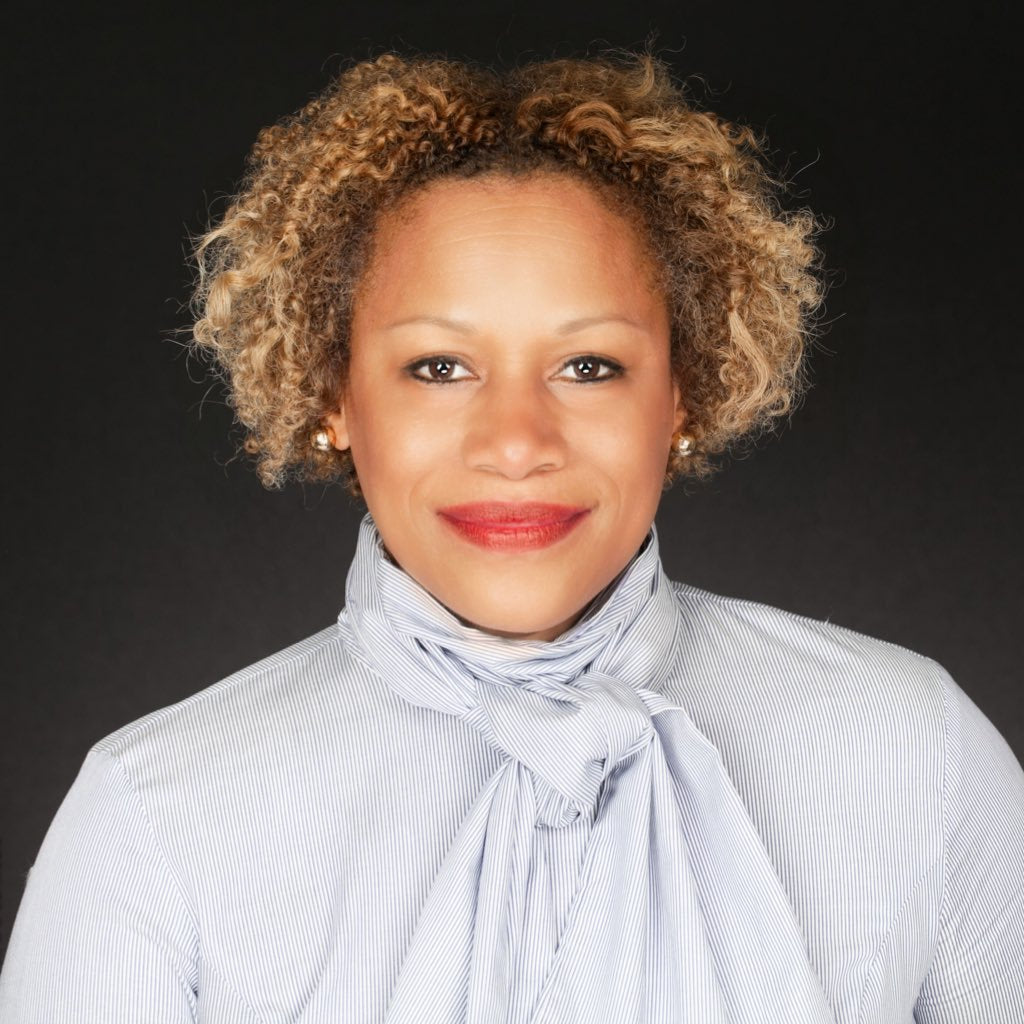
Power Babe Interview | with Dr. Vida Samuel of the University of Connecticut
I’m thrilled to introduce this month’s Power Babe, Dr. Vida Samuel. When I was asked the question during one of my interviews – “Who is a woman you look up to?” – Vida’s beautiful face pop into my head.
Vida is Assistant Professor in Residence in the Department of Human Development at the University of Connecticut’s Stamford campus. She’s a women’s studies and intercultural communication scholar whose research focuses on the sexual lives of women at midlife.
I recently had the honor of guest-speaking in one of her classes at UConn, and walking through the halls with her felt like I was accompanying a beloved rock star. She is a woman who has devoted her life to the pursuit of knowledge and is dedicated to bettering the lives of women near and far.
You teach your class “Issues in Human Sexuality”. How would you define Human Sexuality in today’s world? Has it changed?
That is a critical series of questions which get to the heart of contemporary human sexuality. The discipline is both inclusive and intersectional today.
To explain this, let me reference the middle of the last century, prior to feminist movements, when we discussed human sexuality in a biological sense as either gender or sex – they were the same thing – or sexual behavior, not both. The topic was essentialist in its description and the way in which it was treated. For example, men had minimum reproductive responsibilities while women were burdened by all sexual labor. Women had to think of pregnancy, pregnancy prevention and social implications of having sex regardless of marital status. Men and women had specific gender roles and therefore imposed sexual functions.
In my class, human sexuality necessarily takes on a different tenor. It is impossible to make sexual labor discretely gendered or solely based on behavior and decisions. It is ultimately the examination of both biology and erotic impulse rooted in culture, race, ethnicity, religion, ability, sexual orientation, age, health, socioeconomic status and anything that might influence how human sexuality is understood.
Any Misconceptions in Human Sexuality?
A common misconception in my classroom is when self-identified women suggest assuming behaviors traditionally prescribed to heterosexual men – indifference, dispassion and sexual animalism – liberates women from stigma and dogmatic ideologies of women as “sluts.”
I invariably ask the question, ‘are we complicit in our own diminishment and are we relinquishing our uniqueness just to say we can do it like a man?’ I disagree with that approach. Women are not a different version of men, we are women. There is no comparison to be made, period.
What are some of the biggest issues today regarding human sexuality and women’s rights?
Don’t get me started. I believe over time, generations have come to believe that the hard-earned rights conferred upon us by historic women’s movements have no real relevance for them.
The accomplishments of civil rights have little application for them beyond women’s month and Black History month because they were born into a society where everyone appears to have equal rights based on gender, ability and religion, for example.
They attend integrated schools and everyone can have a mobile device. They have little idea of how we got here and to whom we owe this enormous debt.
Reproductive rights and voting rights are treated as settled and reconciled and forever available to us. Not so.
I am a transnational and understand well that I am a beneficiary of the work of Shirley Chisolm, Gloria Steinem, Betty Friedan, Angela Davis, Hilary Clinton, Marge Piercy and Audre Lorde and every woman who gave up some part of their lives in exchange for commitment to freedoms I enjoy, well before I came to this country.
I understand the right of women to vote, the right to choose to terminate or keep a pregnancy, the right to marry or not marry, the ability to apply for credit and the privilege of holding a driver’s license as quantifiable details that were not an absolute for women once upon a time.
The Equal Rights Amendment is still in a state of purgatory in sixteen states in the US and conservatives insist on re-litigating Roe v Wade in states that are anxious to see women in a state of political paralysis because “the personal is political.”
In fact, everything we do in the name of feminism and civil rights associated with it requires maintenance. Like everything else, women’s rights need attention to ensure an enduring survival. And these are just the issues that keep me up at night.
The point I want to highlight is that women’s issues are never resolved. We keep having to fight to be acknowledged as equal human beings to men and some women who insist our existence should not be an equitable one. A peculiar chronic practice of gendered colonization.

What does Feminism mean to you?
I am consistent with my response that I am an unapologetic, über feminist.
Feminism to me is conceding that oppression based on gender exists and as a society we have a fundamental responsibility to call it out and work to lessen its effects on everyone.
Gender oppression does not only impact the immediately oppressed human but also everyone in that person’s orbit. The oppression of women also extends to any group that oppressors feel are consistent with characteristics of women.
Think of the phrases “runs like a girl” or “plays with dolls.” Those descriptions are not often positive associations. It is not okay to use behavior connected with women as a form of insult to women and others. It is maddening.
My generation’s brand of feminism isn’t reactionary but practical and concrete. We had the advantage of the baby boomers’ fights to get us to this place. Feminism as a negligible symbol, reflects our collective neglect of, and amnesia about its achievements.
We stopped thinking about feminism as something that is incomplete for women. Feminism is not just wearing what we want to or the right to act or speak “like a man” or defining ourselves in relation to men.
If you had a magic wand, what would you like to see changed for women?
A female US president, equal pay for equal work for women, and a critical awareness for all girls and women that we must still work toward a just and equitable world for ourselves. Our lives and civil rights depend on our engagement.
What does being a Babe With The Power mean to you?
Power conferred by other women is real and collaborative power and the mark of competence. It is not a site of arbitrary oppression but one of a collective meant to be shared. As an educator, I hope my students will surpass my scholarship, and I use my influence to guide them to that place. Intellectuality and knowledge are currency for women.
What are some of your favorite feminist books, songs, podcasts and influencers as we focus on Women's History Month?
I must say that I do not follow any social media “influencers” but I think we follow social media and influencers because we are hopeful about the world in which we live. That said, I will recommend two in each category because this list can get very long.
Read anything by Chimimanda Ngozi Adichie but especially, We Should all be Feminists and Simone deBeauvoir’s The Second Sex, written in 1949 still has resonance for today because it argued that man is considered the default, while woman is considered the “Other:” so humanity is male and man defines woman not as herself but as relative to him. It is impactful as an historical text.
Listen to Sara Tavares’ Balance – she is a powerful and soulful musician and singer. Even if you do not understand Portuguese, the power is in one’s individual interpretation of her music. And, listen to Alanis Morrisette’s Jagged Little Pill and see the Broadway show by the same name.
I have some interest in this so I recommend listening to the LiveGirl podcasts. The organization invests in young girls from middle school to high school by creating a collaborative space for all girls. The organization’s mission is to empower and equip the next generation of brave, inclusive leaders.
I am not sure if Krista Tippett considers herself a feminist but I listen to her “On Being” programs and podcasts. The program challenges me to constantly reexamine my moral compass and intellectual capacity for thought diversity.
Dr. Vida Samuel is an Assistant Professor in Residence in the Department of Human Development and Family Sciences at the University of Connecticut’s Stamford campus. Prior to teaching and researching at UConn, she earned a Masters of Arts in speech and interpersonal communication from New York University, then went on to earn a PhD with a focus in intercultural communication and women’s studies at Howard University. Through her work since, she has served on panels that have sparked conversations surrounding feminism, and has edited books exploring Black culture (and this is all in addition to her teaching and research!) More recently, Vida serves on the board of LiveGirl, is on the scholarship evaluation committee for the Mandela-Washington Fellows program and, as an academic mentor for the annual Jackie Robinson Foundation Mentoring and Leadership Conference.
About The Author
Inventor of The WaterSlyde, a revolutionary, patented feminine hygiene device / stimulator, and co-owner of Lovability, Maureen Pollack believes in removing the stigma surrounding sexual health and personal hygiene. She is also an intimacy coach, helping empower women in all stages of life to embrace intimacy through coaching and lifestyle products. A book and feature film about Maureen’s journey as a “mompreneur” are currently in pre-production.

Women of Color Who Shaped Modern Feminism
Let's celebrate 12 feminist women of color who have significantly contributed to the advancement of women in America.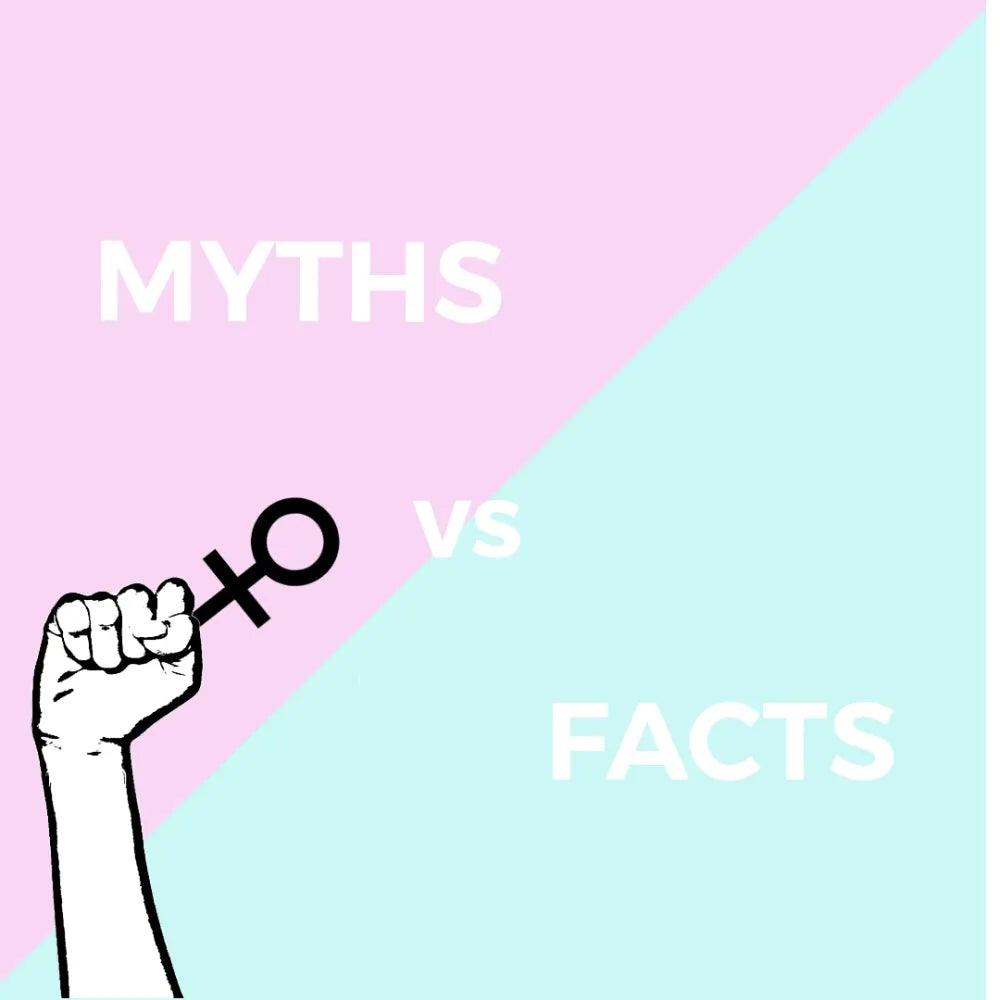
Debunking Feminist Myths
Think you know everything about feminism? Think you know nothing at all? Think again! Check out this article where we debunk 10 feminist myths.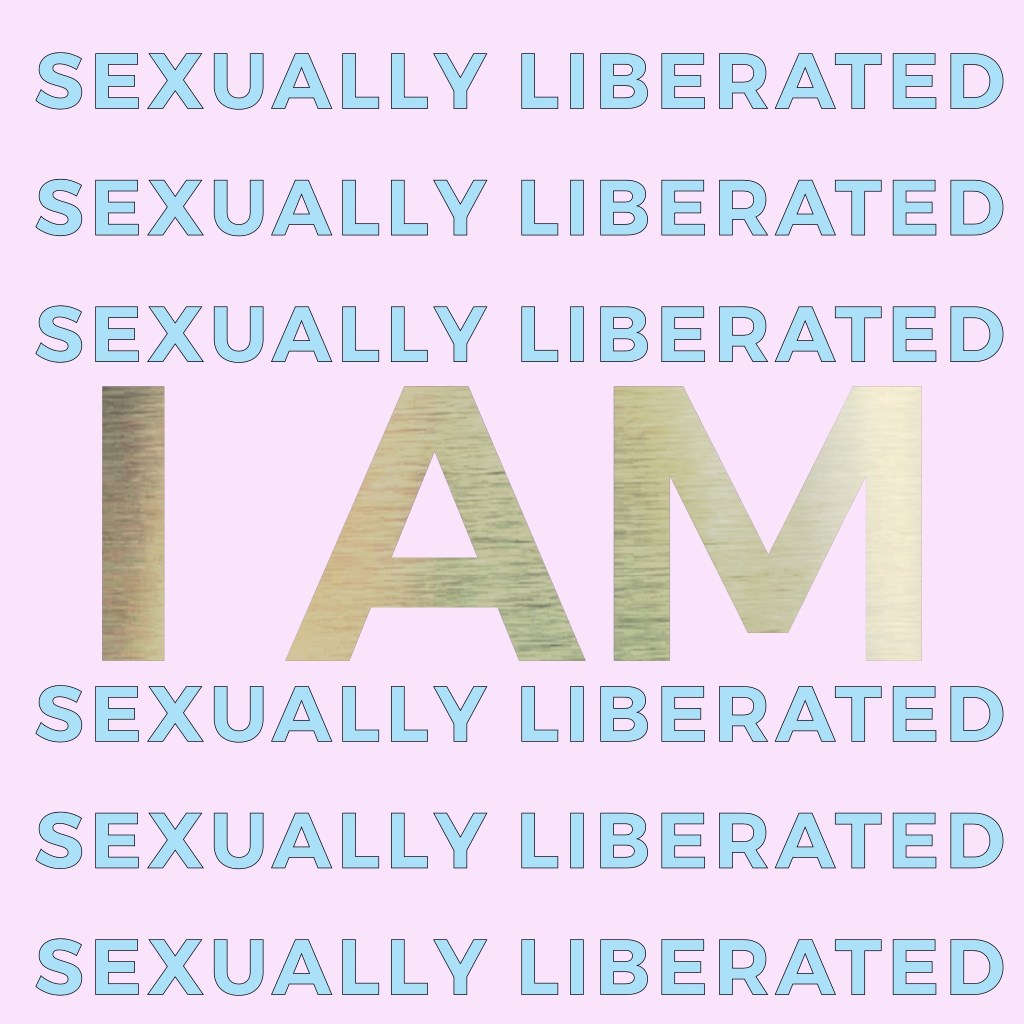
What Being a Sexually Liberated Woman Really Looks Like
Far from the famed Sexual Liberation Movement of the 60s and 70s, here we are in 2019 still having to scream that our bodies are our own. It only makes sense that so many of us choose to disregard the masses and the traditional, and remove ourselves as much from the patriarchy as humanly possible.
Many of us call ourselves sexually liberated because we express ourselves how we want and have sex when we want regardless of society's opinion. But, if you really want to be in control of your sexuality and empower the women around you, Id like to suggest a few more factors to keep in mind.
You're in Control - Whether You're a Virgin or Have Sex Twice a Day
What you do with your body is YOUR choice... point blank... period. The choice to have sex is yours to make; the choice not to is yours as well. Institutions shouldnt have any say in the personal decisions you make about your body: not your abstinence only sex ed class in school, not a congressman, not a pastor, not your partner, not your classmates, not your coworkers.
Ignore the Expectations
The media and our culture are constantly telling us who we have to be. Where we have to shave, what our body shapes have to be. Have too much sex and society calls you a slut; don't have any and society calls you a prude. Its a lose-lose situation, so it's time to stop listening.
Maybe, for you, this means changing your media intake. Start following body positive, queer and POC influencers or models. Some of my favorites are @phloonie, @tessholliday, @wheelchair_rapunzel, @ihartericka, and @watchshayslay on Instagram. Theres such a diversity in women and we're all beautiful; you've gotta revamp your idea of what an Instagram baddie is.
It's really important to consider the porn you watch, too. If you're not seeing yourself represented, how can you visualize being autonomous in the bedroom? Switching it up will help with your feelings of deservingness in sexual interactions. Some good places to look for more representative, ethical porn are Make Love Not Porn, Crashpad Series, Pinklabel TV, and Queerporn TV.
Know Your O, and Tell Them How To Get There
Your partner is not a mind reader (wouldn't that be nice). Statistics show sex is better for all parties involved when theres communication, in fact, your sexual satisfaction can increase by 54 percent once you get to talking. Maybe you think that conversing during sex would be awkward, but communication can be sexy! Talking about what you want to do to your partners body, what you want done to yours, and what feels good, is a huge audible turn on. And communication doesn't have to be with words, its hot to physically show your partner what you like as well.
And how can you tell them how you want it if you don't know? Setting aside time to explore your body on your own is always a good idea. Investing in body-safe sex essential products, like condoms and lube, can help you discover just how you like to orgasm.
Hold Off on Judgement
Sexually liberated women NEVER judge their sisters in liberation. The world is harsh enough, and if we cant support each other, who will? If your more traditional family has something to say about your cousins crop top speak up! If you hear male friends talking about a female classmates reputation speak up!
If you want more real life examples, statistics and information about standing up in everyday interactions, you should read the Feminist Fight Club by Jessica Bennet. It's the holy grail handbook to confronting sexism on a daily basis.
Be Proactive And Prepared
Being sexually liberated means never associating sex with guilt. Being prepared means carrying condoms and being tested regularly. Many schools, universities, and Planned Parenthood offices offer free or affordable birth control and STI testing, and now there are apps that do, too. You can try TBD Health (at-home STI test) or The Pill Club.
Being prepared also means staying educated. Learn about anatomy, about the types of sex you've never had, about the marginalization of sex workers -- learn it all. Sex positive podcasts, like Pillow Talk and Sex Ed in Color and sex positive books, like The Ethical Slut and Come as You Are, are all fantastic resources
And, most important of all, accept yourself and all the women you know. It's the only way we move forward.
_______________________________________
About the author
A sophomore at New York University currently studying Gender and Sexuality Studies, Tara Jones hopes to get her Masters in Human Sexuality and go into either sex therapy or sex education. She wants to bring attention to how injustice manifests in sexual interactions and the orgasm gap. In Tara's free time, she runs a small business designing and creating swimwear (@bytaraj on Instagram).


